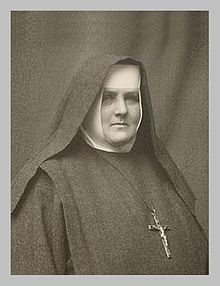Bernardyna Maria Jabłońska
Bernardyna Maria Jabłońska (born August 5, 1878 in Pizuny, † September 23, 1940 in Krakow , Poland ) was a Roman Catholic religious and co-founder of the Congregation of the Albertine Sisters, Servants of the Poor. In the Catholic Church she is venerated as a blessed.
Life
Maria Jabłońska was born on August 5, 1878. Her parents Grzegorz and Maria were devout farmers and had four children. The day after she was born, she was baptized in Lipsk Church. She grew up in a rural atmosphere and developed a lively disposition. Because the school was far from home, she received lessons from a private tutor. Maria did not know how to tame this. Because of this, she was given to distant relatives where she received only fragmentary instruction. So Maria only learned to read and write something.
The mother's death abruptly interrupted Maria's happy childhood when she was 15 and turned her life around completely. Mary herself later referred to this event as her conversion. Her mother was deeply religious and had a great influence on the daughter. From her mother Mary mainly took over the worship of the Eucharist and filial love for the Blessed Mother. Mary prayed a lot and read a lot, especially the biographies of saints. In this way she recognized her own calling to religious life and turned down a marriage proposal.
On July 13, 1896, she met Brother Albert Chmielowski for the first time in Horyniec and asked him to join the "Servants of the Poor" which he founded in 1891, which she initially considered to be a monastic, contemplative order. On August 13th of the same year Maria went to Brusno to a remote house of the sisters. When they joined, the sisters did not form a recognized congregation. Although they wore a linen religious robe and followed a daily routine characterized by prayer and meditation, they were not bound by vows. At that time they were still considered a private charitable institution.
After ten months of postulate, Maria received the religious dress on June 3, 1897 together with six other postulants and chose the name Bernhardyna. At the same time, she took the vow as a terciar. After that, the young sister was sent to the homeless hospice in Krakow, where she met the extreme material and moral hardship of the poor, sick and needy. Since she had previously led a life of silence and prayer, she was so shaken by the need that she wanted to give up immediately.
Brother Albert explained to her that working among the needy was a very difficult, but fascinating, form of love that offered the highest degree of holiness. On Holy Saturday 1899, when Bernardyna was about to give up religious life, Brother Albert managed to guide Bernardyna with wise words. From that moment on, all doubts vanished and she could keep her promise. She managed to carry out her charitable tasks with the help of a mystical contemplation. Brother Albert appointed Bernardyna superior of the house in Cracow in 1899 and on April 7, 1902, at the age of only 24, superior general of the still-developing community. With that she took over the management of six houses for the poor, in which 30 sisters worked.
Sister Bernhardyna led the community at Brother Albert's side until his death on December 25, 1916. The time of the First World War was a pretty difficult time. Society was impoverished due to the war, there were many homeless, disabled and orphans. Bernardyna now had to take care of all this difficult task and keep the charism of the founder alive in the community. Brother Albert had left the community with no written constitutions, nor was there any written recognition from the church authorities. When Sister Bernhardyna was unanimously re-elected as Superior General at the first chapter of the community on February 9, 1922 by her fellow sisters, she immediately began to work out the constitutions. At night she worked, prayed and wrote on her knees, while during the day she looked after the sisters and the poor.
On June 19, 1926, the Congregation of the Sisters of the Third Order of St. Francis, servants of the poor, the first diocesan approbation. On December 25, 1927, Sister Bernhardyna and 33 companions took the simple religious vows and three years later, on December 25, 1930, the perpetual vows.
At the end of her life of self-sacrifice for the poor and their fellow sisters, her body was littered with purulent ulcers that reached to the bones. Sr. Bernhardina died on September 23, 1940 and was buried in the Rakowicki Cemetery in Krakow. Her legacy to the sisters read: "Do good to everyone!" At the time of her death, the congregation had 500 sisters in 56 branches.
In 1984 her remains were transferred to the church "Ecce Homo" in the mother house, where the relics of Brother Albert are now also located.
beatification
Pope John Paul II beatified Bernardyna Jabłońska on June 6, 1997 at a mass in Zakopane . Her relics are in the "Ecce Homo" sanctuary in Kraków, next to the grave of St. Brother Albert Chmielowski .
Remembrance day
Her feast day in the liturgy of the Church is the anniversary of her death, September 23rd .
Web links
- - The biography of Bernardyna Maria Jabłońska on the IGW Verlag website
- - Short biography of Bernardyna Maria Jabłońska on the Albertine Sisters website
- - Biography of Bernardyna Maria Jabłońska on santiebeati.it (ital.)
| personal data | |
|---|---|
| SURNAME | Jabłońska, Bernardyna Maria |
| ALTERNATIVE NAMES | Jabłońska, Bernardyna; Jablonska, Bernardina |
| BRIEF DESCRIPTION | Polish Roman Catholic nun and founder of the order, Blessed |
| DATE OF BIRTH | August 5, 1878 |
| PLACE OF BIRTH | Pizuny |
| DATE OF DEATH | September 23, 1940 |
| Place of death | Krakow |


